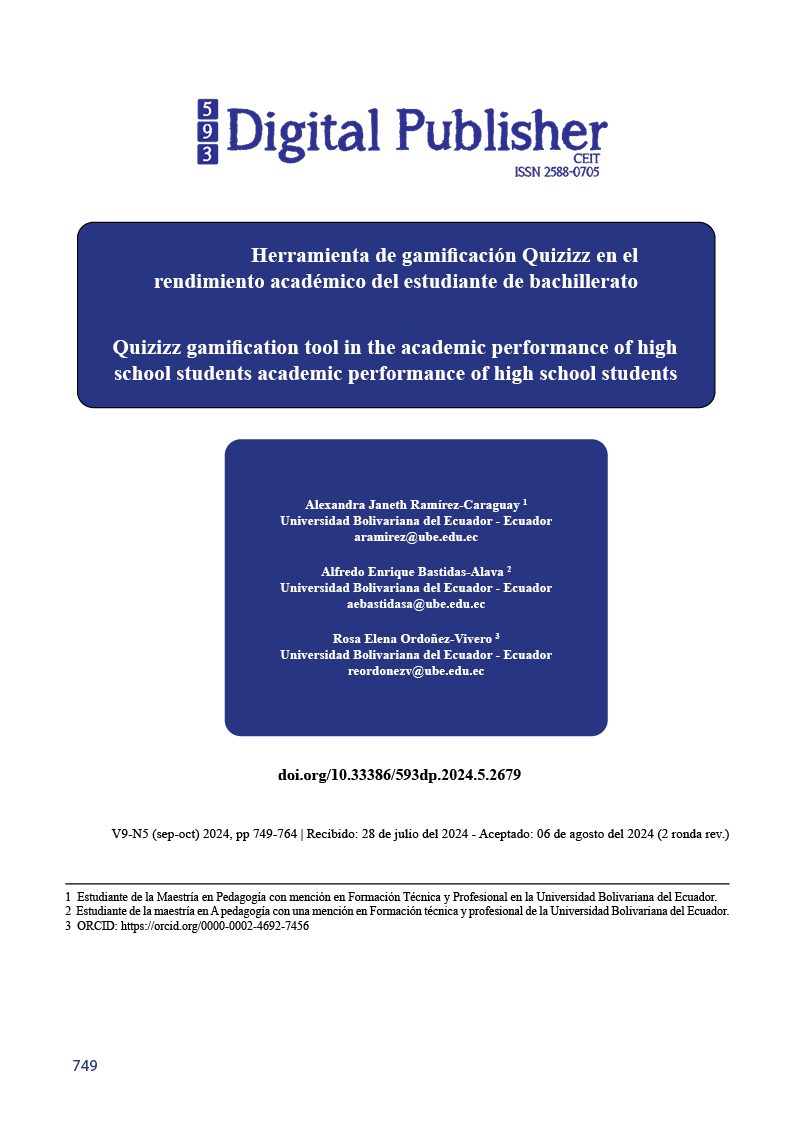Quizizz gamification tool in the academic performance of high school students academic performance of high school students
Main Article Content
Abstract
Gamification is a learning technique that transfers the operation of games to the professional educational field in order to achieve better results, either to better achieve some knowledge, optimize some skill, or reward precise actions. This study focuses on the gamification of the teaching-learning process, through the implementation of Quizizz, an online educational platform, and its influence on the performance of High school students in the professional figure of Accounting Technician in the Chongón Educational Unit of Ecuador. The objective was to evaluate the impact of the implementation of Quizizz on the academic performance of students in the subject of Accounting and Tax Packages. The research had a quantitative approach, of the type of research by pre-experimental design; for its explanatory scope, for its obtaining of field and longitudinal section data. The study was carried out in the analysis period corresponding to the academic year 2023-2024. Theoretical methods such as historical-logical analysis, induction-deduction and analysis-synthesis were used. In addition, empirical methods such as document review, survey, interview, statistical-mathematical methods for information processing, as well as methodological triangulation and pre-experimental. The importance of gamification was recognized as a way to acquire meaningful learning and the development of cognitive and socio-affective components in students. It is concluded that gamification, through the Quizizz tool, is an innovative strategy that mixes the elements of the game so that students internalize knowledge and live the teaching-learning process as a pleasant experience. The inclusion of gamification in Accounting and Tax Package classes is recommended as it positively influences the learning and academic performance of students of the Technical Baccalaureate in Accounting in Ecuador.
Downloads
Article Details

This work is licensed under a Creative Commons Attribution-NonCommercial-ShareAlike 4.0 International License.
1. Derechos de autor
Las obras que se publican en 593 Digital Publisher CEIT están sujetas a los siguientes términos:
1.1. 593 Digital Publisher CEIT, conserva los derechos patrimoniales (copyright) de las obras publicadas, favorece y permite la reutilización de las mismas bajo la licencia Licencia Creative Commons 4.0 de Reconocimiento-NoComercial-CompartirIgual 4.0, por lo cual se pueden copiar, usar, difundir, transmitir y exponer públicamente, siempre que:
1.1.a. Se cite la autoría y fuente original de su publicación (revista, editorial, URL).
1.1.b. No se usen para fines comerciales u onerosos.
1.1.c. Se mencione la existencia y especificaciones de esta licencia de uso.
References
Albán Romero, L., Mendoza Jara, M., López Fernández, R., & Tapia Bastidas, T. (2023). Recursos didácticos digitales en la presencialidad: Dificultades en las buenas prácticas docente. MENDIVE, 21(4). https://mendive.upr.edu.cu/index.php/MendiveUPR/article/view/3632
Balasubramanian, K. (2017). Moving towards borderless and limitless classroom: Blending Skype, Nearpod and Quizizz applications in the teaching and learning. International University Carnival on e-Learning (IUCEL). http://creativecommons.org/licences/by-sa/4.0
Bazurto-Briones, N. A., & García-Vera, C. E. (2021). Flipped Classroom con Edpuzzle para el fortalecimiento de la comprensión lectora. Polo del Conocimiento, 6(3). http://polodelconocimiento.com/ojs/index.php/es
Catagua-Mendoza, C. A., & Vigueras-Moreno, J. A. (2023). La herramienta de gamificación Quizizz para el fortalecimiento del proceso evaluativo de los docentes. MQRInvestigar, 7(3), Article 3. https://doi.org/10.56048/MQR20225.7.3.2023.2381-2404
Cuadros González, L. Y., & López Niño, A. del P. (2020). Gamificación como estrategia para fortalecer la producción textual en Ciencias Naturales. Revista Docencia Universitaria, 21(1), 55-79. https://revistas.uis.edu.co/index.php/revistadocencia/article/view/11379
Estrella Yánez, I., & Sierra Álvarez, L. (2022). Uso del recurso educativo digital Quizizz como estrategia pedagógica para el desarrollo de la interpretación textual a partir de la lectura de imágenes en los estudiantes de grado 1° grupo 3 de la Institución Educativa Madre Amalia de Sincelejo (p. 189 hojas) [Application/pdf]. Universidad de Cartagena. https://doi.org/10.57799/11227/1615
Fernández, Z. R., Borges, M. E. D., Betancourt, B. D., & Pérez, Z. R. (2022). El proceso pedagógico y los objetivos formativos en la educación. EDUMECENTRO, 14(0), Article 0. https://revedumecentro.sld.cu/index.php/edumc/article/view/e2120
García Casaus, F., Cara Muñoz, J. F., Martínez Sánchez, J. A., & Cara Muñoz, M. M. (2021). La gamificación en el aula como herramienta motivadora en el proceso de enseñanza-aprendizaje. Logía, educación física y deporte., 1(2), 43-52.
Gómez-Paladines, L. J., & Ávila-Mediavilla, C. M. (2021). Gamificación como estrategia de motivación en el proceso de enseñanza y aprendizaje. Revista Arbitrada Interdisciplinaria Koinonía, 6(3), 329. https://doi.org/10.35381/r.k.v6i3.1316
Gutiérrez González, A., & Río Rey, C. (2019). Implementación de herramientas de evaluación en tiempo real: ¡Una experiencia práctica con Kahoot!, Plickers y Quizizz. Universidad de La Laguna. http://riull.ull.es/xmlui/handle/915/15072
Hamari, J., Shernoff, D. J., Rowe, E., Coller, B., Asbell-Clarke, J., & Edwards, T. (2016). Challenging games help students learn: An empirical study on engagement, flow and immersion in game-based learning. Computers in Human Behavior, 54, 170-179. https://doi.org/10.1016/j.chb.2015.07.045
Huaman Bautista, J. E. (2021). Uso de la herramienta quizizz en el aprendizaje de las funciones reales en una universidad privada. Universidad César Vallejo]. https://hdl.handle.net/20.500.12692/58033
Malone, T., & Lepper. (1987). Making Learning Fun: A Taxonomy of Intrinsic Motivations for Learning. Aptitude, 3.
Masrop, N. A. M., Ishak, H., Zainuddin, G., Ramlan, S. R., Sahrir, M. S., & Hashim, H. (2019). Digital Games Based Language Learning for Arabic Literacy Remedial. Creative Education, 10(12), 3213-3222. https://doi.org/10.4236/ce.2019.1012245
Ministerio de Educación del Ecuador. (2018). Informe anual de rendición de cuentas 2018. Comité Editorial PISA-. www.educacion.gob.ec
Ordóñez Gutiérrez, M. A., & Farfán Pacheco, P. C. (2022). La gamificación como estrategia didáctica en el aprendizaje - enseñanza de operaciones aritméticas con números racionales en séptimo de básica de la escuela Juan José Flore. Universidad Politécnica Salesiana. http://dspace.ups.edu.ec/handle/123456789/22673
Ordóñez Torres, W. R. (2020). Quizizz: una nueva plataforma para evaluar. Informatica, educación y pedagogía, 9, 37-41. https://revistas.udenar.edu.co/index.php/runin/article/view/5847
Parrales Poveda, M. L., Fienco Parrales, J., Fienco Parrales, M. J., & Fienco Collantes, J. V. (2023). Gamificación en el Proceso Enseñanza-Aprendizaje. Revista Ciencia y Líderes, 2(1), 4-14. https://doi.org/10.47230/revista.ciencia-lideres.v2.n1.2023.4-14
Pérez Gallardo, E., & Gértrudix-Barrio, F. (2021). Ventajas de la gamificación en el ámbito de la educación formal en España. Una revisión bibliográfica en el período de 2015-2020. Contextos Educativos. Revista de Educación, 28. https://doi.org/10.18172/con.4741
Quintero Quintero, M. T., & Orozco Vallejo, H. M. (2013). El desempeño académico: Una opción para la cualificación de las instituciones educativas. Plumilla Educativa, 12(2), 93-115.
Quispe, B. M., Fernández Gambarini, C. W., Palomino, Y. A., Addison, A., & Quispihuanca, C. (2019sp). Análisis de las herramientas de gamificación online Kahoot y Quizizz en el proceso de retroalimentacion de aprendizajes de los estudiantes. Referencia Pedagógica, 7(2).
Reyes Cabrera, W. R., & Quiñonez Pech, S. H. (2018). El potencial de la gamificación para la educación a distancia en México. Revista científica electrónica de Educación y Comunicación en la Sociedad del Conocimiento, 1(18), 173-195. http://www.eticanet.org
Robles Gonzales, H. E., Salamanca Chaparro, R. X., & Laura De La Cruz, K. M. (2022). Quizizz y su aplicación en el aprendizaje de los estudiantes de la carrera profesional de idioma extranjero. 4(e239). https://doi.org/10.37073/puriq.4.1.239
Sanahuja, J. A., & Tezanos Vázquez, S. (2017). «Del milenio a la sostenibilidad»: Retos y perspectivas de la Agenda 2030 para el desarrollo sostenible. Política y Sociedad, 54(2), 521-543. https://doi.org/10.5209/POSO.51926
Torre, C. M. D. (2023). Herramientas de gamificación para la evaluación de competencias en ingeniería de la reacción Química. Complutense.
https://dx.doi.org/10.5209/RCED
Velásquez Ortega, N. M. (2021). Classcraft en el aprendizaje de biología en el bachillerato [Tesis de Maestría]. Universidad Tecnológica Indoamérica. https://repositorio.uti.edu.ec//handle/123456789/2878
Vital Carrillo, M. (2021). Plataformas Educativas y herramientas digitales para el aprendizaje. Vida Científica, 9(18), 9-12. https://repository.uaeh.edu.mx/revistas/index.php/prepa4/article/view/7593
Zhao, F. (2019). Using Quizizz to Integrate Fun Multiplayer Activity in the Accounting Classroom. International Journal of Higher Education, 8(1), 37. https://doi.org/10.5430/ijhe.v8n1p37




